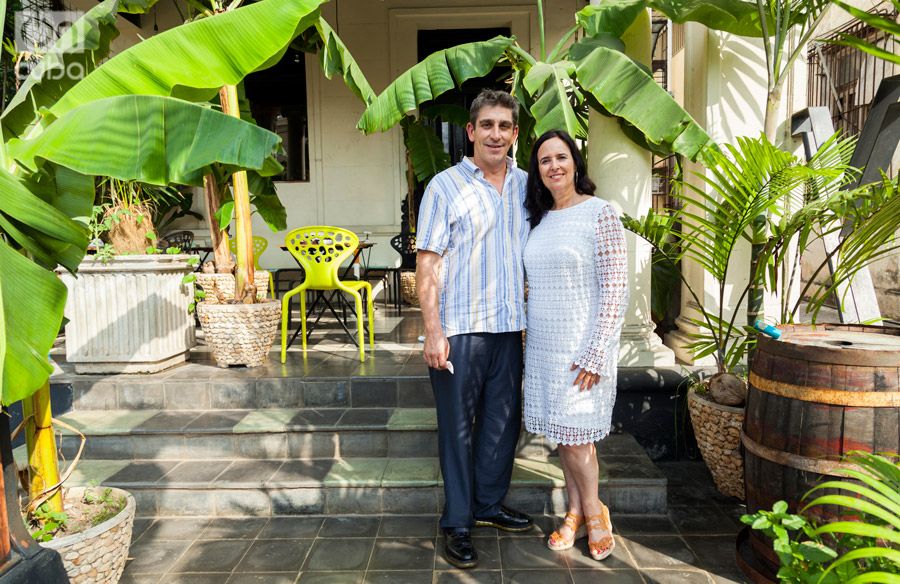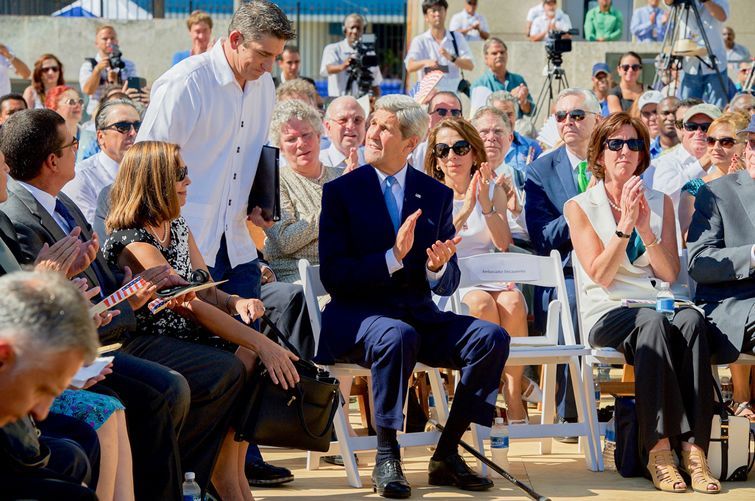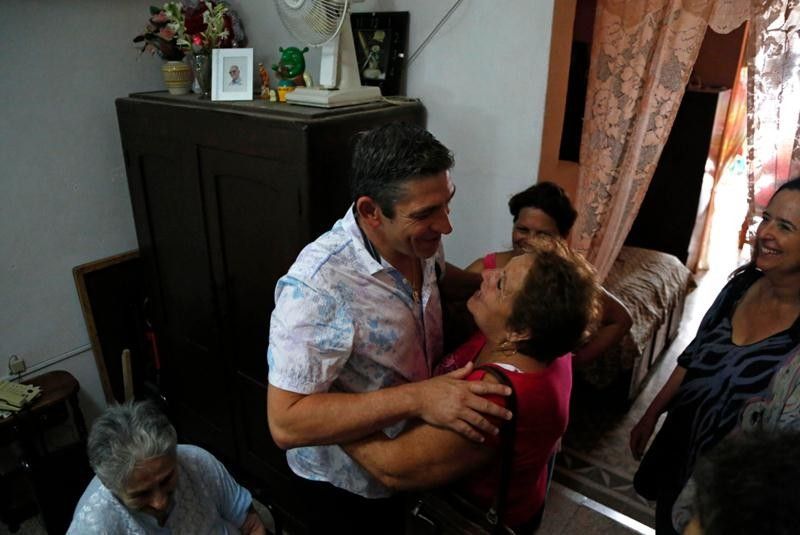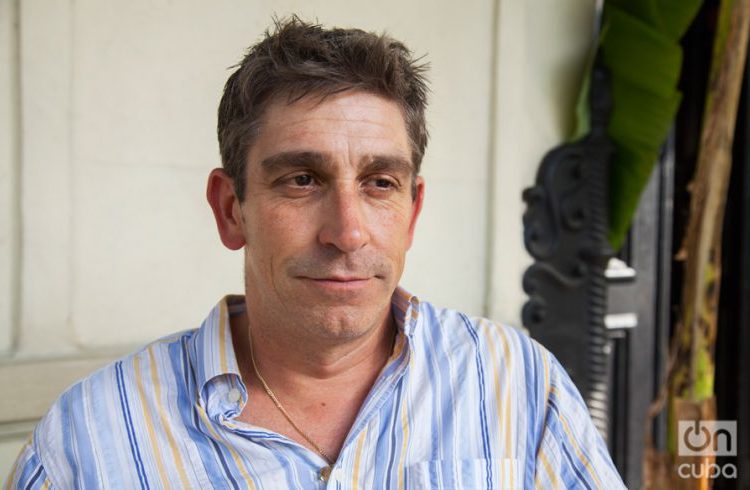The “presidential poet” cries once in a while. “I like to cry, I can’t help it,” and he laughs. He is smoking in the porch of a vintage café on 23rd Street, in El Vedado. This time he came heading a literary delegation of CubaOne Foundation, together with writer and anthropologist Ruth Behar. We spoke on the last day of his eighth trip to Cuba, the first accompanying Cuban-American millennials to get to know Cuba, to build relations and to explore his own family history.
The son of Cubans, born in Spain and brought up in Miami, Richard Blanco recited on January 2013 his poem “One Today” in the second investiture of Barack Obama. And in 2015 “Matter of the Sea” or “Cosas del mar” at the reopening of the U.S. embassy in Havana. “For all those who thought that not even the sea could separate us,” he said then, “the waves don’t know from what country they are or where they crash.”
What do you do when you’re in Cuba? Do you walk? What is your route, what is the Cuba that you look at?
Each trip to Cuba is different. It always changes. Since 1994, when I came during the special period – even though I didn’t know about it and I found out later. I had nothing to compare it with, it was my first time. Imagine how moving because my mom left her entire family in Cuba: her eight brothers, her father, all her uncles, aunts, all the cousins…. That trip was the strongest. I would go to bed every night crying because I felt…I can’t even explain well how…. Imagine at last meeting a family that I had always and never known. Seeing that they are real lives, houses, faces, names….
Each trip has been different, they have represented another stage for me. I’ve been seeing different parts of Cuba little by little. I had never made a cultural trip like this one. Now I saw another part of Cuba I hadn’t seen. I met writers, I went to Casa de las Américas, I got to know about visual arts, Cuban galleries…. Another cultural connection opened up for me, as a writer, as an artist. I am making other connections to Cuba which in themselves have nothing to do with my family.
Had you read Cuban literature?
Very little. I bit of Nicolás Guillén, José Martí of course…. But my tradition is U.S. literature and I write in English, or in Spanglish. I always try to bring things in Spanish because I am writing about Cuban-American culture or the search of us the Cuban-Americans, which in a certain way is the search we all have: about from where we are, from where we came, you know.

I’m a bit intrigued by how this works, let’s say: do you feel a bit more Cuban every time you come here? How is it?
It has been an evolution that has had its stages. People believe – especially in the United States – that as the son of Cuban-Americans you are brought up adoring Cuban culture. That is not true! Those were our parents, we felt like little Americans! What your parents do is always ridiculous. If your parents want to dance salsa, you want to dance rock and roll; if your parents want to eat this, you want to eat…sushi! But at the same time, all that is marking us, it is leaving an imprint in our psyche.
Then there comes a moment in life, and it happens to everyone, like at around when you are in your twenties, in which you say: “Damn it, who am I and from where do I come and where am I going.” And that question was the first thing that led me to write poetry, to try to navigate and understand those questions, to try to know the answers to those questions.
MISTERS
That’s when I became Mr. Cuban. I became anti-American: I am Cuban, and I want to return to Cuba, and everything was like a focus on everything that was Cuban, everything I had never investigated, everything I had not tried or experienced. It was an immersion. I had to know everything that was Cuba and learn the ugly side of U.S. history. There are very beautiful things, like in every country, but there are very ugly things. And I did not identify myself as an American.
But then in the end I said: “Well, Cuba is almost an impossible thing,” in the sense of living in Cuba and becoming a Cuban. I also realized that it was a country that had developed in its own way and it was not my parents’ Cuba, nor mine in the sense that I had not lived here and in the end I didn’t have the right to say: “I’m here.”
So I used another route and told myself: “Let’s take both.” I moved from Miami – which is like a mini Cuba – to the north, to Connecticut, thinking of going out in search of that United States I had seen on TV, that perfect family from the 1950s, that ideal world of the American dream. And I found out that that was also a tale, that it wasn’t a reality. As an American citizen it was part of what I was, but it was fiction, not completely, but it was.
There I said to myself: “Well, what are we going to do?” And I started traveling the world. I said to myself that perhaps it would be Venice, or it would be Barcelona or England or Japan, but always in that search, with that question. How do we recognize where home is? That is a beautiful word in English, which for me doesn’t make that much sense in Spanish. The Spanish word hogar doesn’t have the same sense. Home implies belonging.
I returned to Miami after having lived in Connecticut and traveling outside the United States, thinking then that perhaps, all things considered, Miami was the only place to which I belonged. The only place that understood me. Living between these two imaginary worlds: between the Cuba that is mine and not mine, between the United States that is mine and not mine at the same time. But Miami had changed so much that I then lost Miami. It was like an exile. Miami changed so much, it grew so much and it was such an enormous thing.
So I went to Maine. Ha ha. To the end of the United States, to the forests of the north, three hours away from Canada. I devoted myself to that idea that perhaps I will never be, that I’m never going to feel that I belong to something. And it’s OK. And it’s then that the White House called me and asked me for the poem.
Basically, it was writing a poem about the United States for its citizens. And then to explore again those questions about belonging, of homeland. Wow. I’m American? Why do they ask me for this if I don’t know if I belong to this country? It was another stage. I felt very American. I told my mom when we were in the president’s investiture: “Mom, well, at last we’re Americans, no?” It seems so, there’s the president, it seems we got here, no? Well: Mr. America. I went from Mr. Cuban to Mr. America.
I took her to the investiture and sat here at my side. Actually, that honor was only possible because of my mom. That story was a continuation of my mom’s story and she is the one who should have read the poem.
There I thought of Cuba and I said to myself “let Cuba continue its path, I’m American now.” And that’s when they asked me to write the poem for the reopening! Like wow, every time I thought I had resolved the problem something like this happened. But they are art questions. What is love? What is belonging? The answer constantly changes, that’ why they are the subjects of art and literature, because they don’t have an ending. They always change. And how beautiful that it’s like that.
In short, there I felt as Cuban and as I felt American. And in the middle of that reopening I said to myself “At last there’s this union!” Not only for me personally but for my mom, for my exiled community, for my cousins in Cuba. At last something was happening that opened a door, something that finally represented a change. And it was when I realized that I didn’t have to choose. Because during my entire life I thought that I had to be Cuban or American. Even Cuban-American didn’t suit me. No, it doesn’t work for me. And I thought, you know: I don’t have to choose! I can be all these things.
And if one looks at what is happening in the world, the narrative that is being written now outside politics, it is that we are all becoming a country, that is, a nation. Politics continues here, over there, wherever, but we are getting to know each other, we travel, we see things, we know that after all we are all human beings; that we have all suffered, that all systems have their good and bad things, that we all have had happy moments and we have had losses. And in the end that is human history, from the beginning. Now I feel like a citizen of the world. I try to tackle my work in that sense: who we are, as Cubans, or as Americans. Who we are as human beings.

Of course there are the cultures that form us, our distinctions, but with respect and knowing that at last we are all talking of the same thing. I am involved in that now and it is what I am doing with CubaOne, because it is the second Cuban-American generation that in the end has that distance of the definitions. I like the way they understand that these connections we are trying to make have nothing to do with politics. Well, they always have to do with politics, but we try to know first how we can connect as human beings and afterwards that that define the politics.
Art is what in the end shapes the world and I have all the faith and hope that it continue being like that. And how in the end the Cuban-Americans, the diaspora and the Cubans on the island are going to understand each other is through art, the human side. And it is so easy! I mean, I get here and immediately one falls into the human side and if one just focuses on the political the world continues evolving and walking with another narrative. And I’m not criticizing Cuba, the same is happening in the United States. With Trump it’s like 10 steps back in that narrative. What he says about America being the best country in the world. You can’t exist alone in this world, that doesn’t exist any longer. That idea that we are tribes….
In a certain sense we’re all the consequence of history, and we do what we can, we try to survive, we try to enjoy, we do art, we try to understand. In the end the only thing that survives all the politics, all the civilizations, has always been art. It is the only thing that in the end tells the emotional history of human beings.
What happened when they asked you to write the poem for the reopening? An “inaugural poet” once again….
When they called for the embassy ceremony, it was more moving than the call for the White House because I wouldn’t ever have thought in my life that, not just that I read a poem in that place, but also that this was happening. And that they asked me to be part of that moment. I was like a lunatic crying on the floor…because in a certain way I believe that all my work has partly been to try to be an agent of the reconciliation. That’s what I say to those who come: “we are agents of reconciliation,” even if it isn’t conscientiously.
I thought of my mom’s pain. She has been a consequence of history; not just of Castro or the Americans, also of Batista and the others who came since the early 20th century. At that moment I felt something so beautiful…. I felt that with my work, my decision to be a poet, my devotion, at last I could do with that something for my mother. That the two governments could at last communicate and that she no longer feel guilty as she had felt her entire life for leaving behind her family. It is a metaphor but in the entire community I know there’s a sense of a great rupture between families. And the Cubans from here feel it. Not just those who left. And that was healing that. My work was able to be part of that moment which I saw as a declaration that at last we can start healing. Reconciliation.
For me it was much more personal and moving because it was something intimate, something which I always thought about since childhood. It was a question that was always on my mind: How can we build that bridge? Not that you go live in Miami or that I move over here, but rather that we can have a relationship like relatives.
GEISA BLANCO
My mom is very reserved. She always says less than what she thinks.
I think that for her it was almost more important to know that her son had that honor because it justified her having made that decision of coming to the United States, leaving her family. I believe my reading that poem for her was like saying “I did well.” It was something that closed her story. She didn’t have to feel guilty, she knew she had done something good. Her decisions were not in vain.
There’s an irony. What happened was that to Obama’s investiture I took my mother and to the reopening of the embassy I took my couple, Mark, who is American. That was another type of compliment: that my husband, who was American, come to Cuba.
It was interesting that it was in an inverted way, it was like feeling that for my mom what happened in the United States was more important, it was for her, and then that moment of the reopening was for me. At last I achieved something that my work always wanted to do: to try to join these two peoples, these two families.

“AND THEN THE 45 GETS HERE”
Donald Trump. But I don’t know if you want to talk about that. I have actually tried to give him a chance, because we live in a democracy and we try to be patient. It even makes me laugh because it is something at the same time funny and only in a democracy like the United States we can elect the first Afro-American president and 8 years later elect a Trump. Some way it makes me feel proud and makes me laugh at the same time.
Democracy has to survive more than Obama, Trump, Washington and Lincoln. It is the government institutions that have to be maintained. It’s like while that is maintained….
But I’m happy that the people have woken up. Because we were half asleep, there was a false sense of security, and we were a bit lazy: “Ok, we achieved the maximum.” No, there are still things we have to resolve.
There’s a word I believe is Cuban with which I like to describe the president: he is a disparate (foolish). The guy is foolish, anyway you look at him. From the right, from the left, from above, from below, naked, dressed, wearing a tie…. What I most fear are not his policies, but rather that you don’t know with whom he’s talking. One day he says one thing about Cuba and the next he says another. He contradicts himself. And for me that is the biggest danger because when you know who your enemy is you can, at least, try diplomatic means, having a conversation, but something that is constant, that makes it possible to make some prediction.
We had a Ronald Reagan, very conservative presidents and we have survived, and we have had liberal presidents…but what most frightens me is that we don’t know with whom we are talking. And it’s not because I am “Obama’s poet” or anything like that. I gave up. He isn’t constant in anything, and at this moment it is a country that is unstable as never before. No one knows, not even his party, what is happening or what is going to happen.
And have you met again with Obama?
I have on several occasions. Once in the Oval Office around two months after his investiture. Afterwards, when the Cuba thing happened I wrote saying several things to him. He said he appreciated my opinions.
He has asked me to form part of a committee of the Obama Foundation to write about those eight years. To write the memoirs for the center that they want to create in Chicago. And one day there were some 14 persons at a super. We spoke about Cuba and I shared my point of view. He said he was greatly concerned about the people. He expressed his emotions at that time, more than his opinions.
AMULETS
Richard wears a gold chain with three charms. “This is San Lázaro, Our Lady of Charity, a jet stone of course because these days there’s a lot of the evil eye. And this is a strange Christ, but it’s what my father was wearing when he died in 1990. I’ve never taken it off. I feel he has been my guide. And my Cuban grandparents on my mother’s side, whom I never met.
“Very few people know this but when I read at President Obama’s investiture, I took two things: the poem, a note from my couple that said something in English, something supportive, ‘I believe in you…’ and a picture taken of a photo of my Cuban grandparents on my mother’s side. It was one of those old photos that were touched up, but my mom took a picture of the photo. The original is still here in Cuba. At that moment, in my psyche, in my mind, I was reading for them.”










